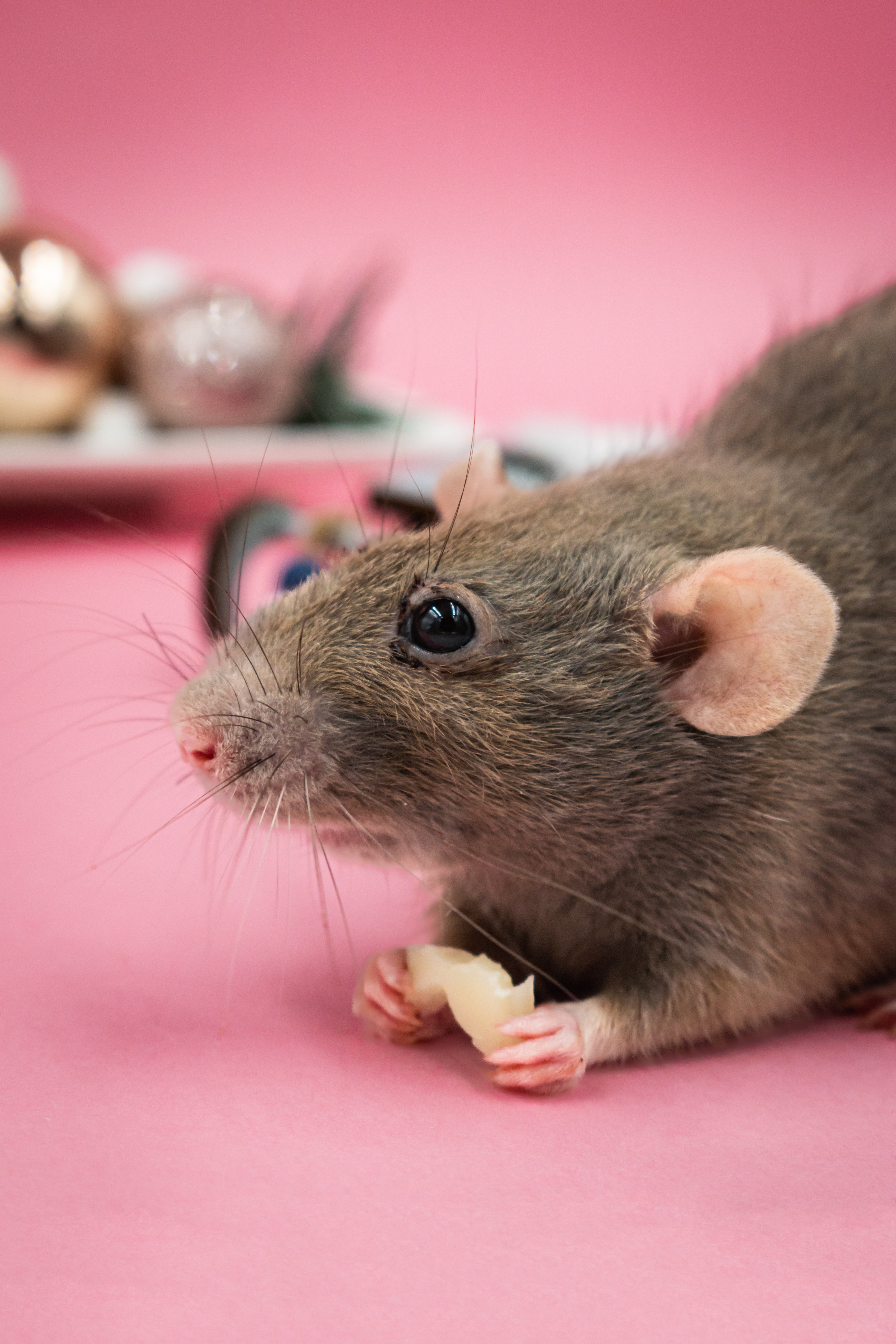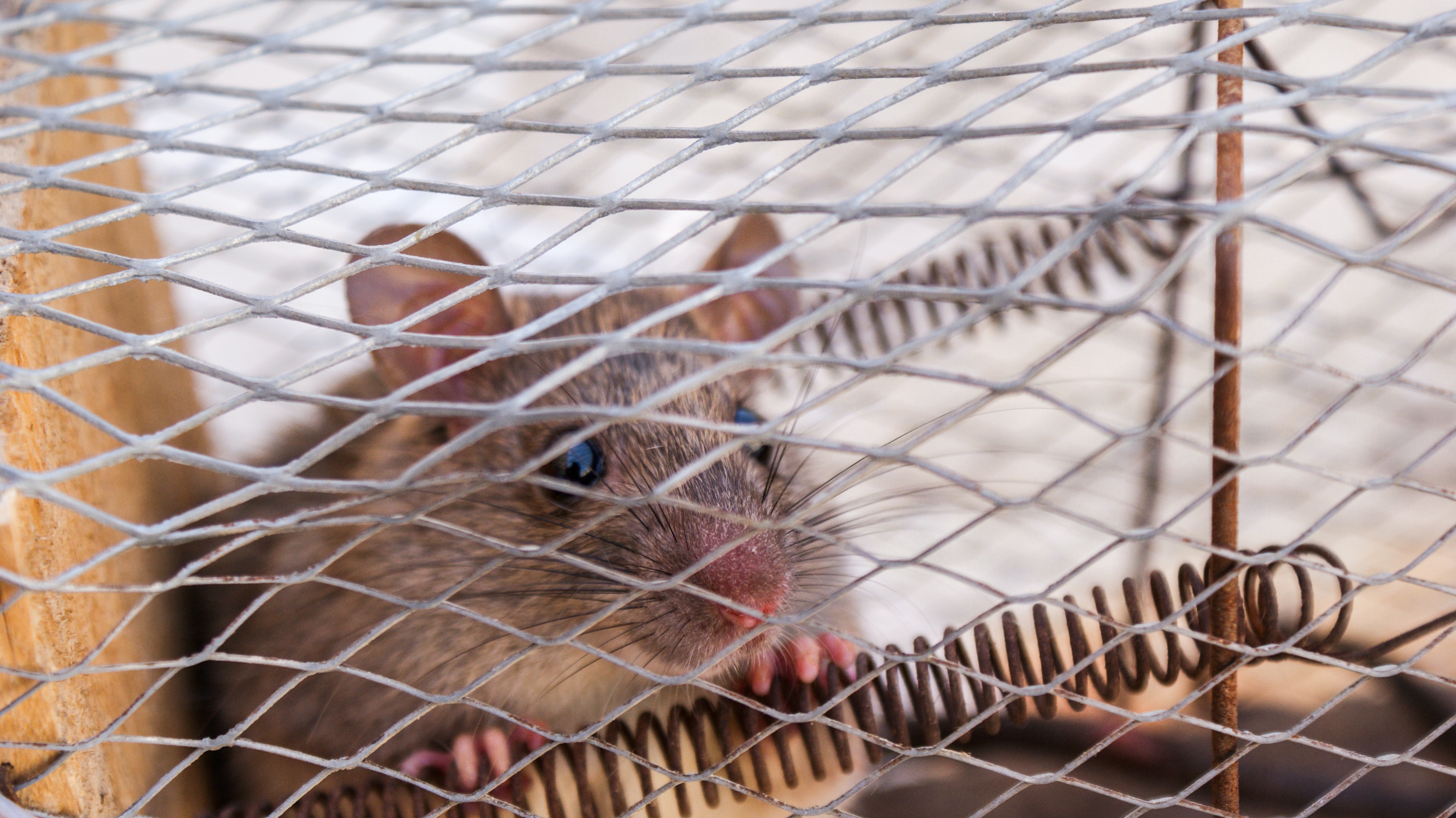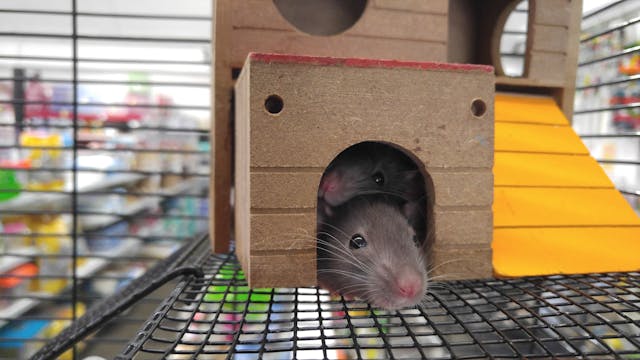- Home
- Best Pet for Me
- Pet Rat Adoption
Pet Rat Adoption
 Photo by Nikolett Emmert: https://www.pexels.com/photo/rad-eating-cheese-15193797/
Photo by Nikolett Emmert: https://www.pexels.com/photo/rad-eating-cheese-15193797/Considering a pet rat adoption?
Smart move!
Rats are intelligent and can be trained to do tricks, be handled, and run mazes.
Pet rescue rats can make wonderful companions and are often underestimated as pets.
They can be great little buddies, forming strong bonds not only with each other but also with their human caretakers.
These intelligent and sociable animals are full of personality, making them a delight to have around.
They thrive on interaction and affection, often enjoying gentle petting, treats, and even playtime with their owners.
Their curiosity and playful nature will keep you entertained with their antics, and their loyalty makes them incredibly endearing.
One of the great things about rescue rats is their adaptability to different lifestyles.
Because of their small size, they are an excellent choice for apartment dwellers or anyone with limited space. They don’t require the same amount of room as larger pets, but they still bring a lot of joy and companionship to their owners.
They’re perfect for busy people who want the rewards of a cuddly pet but might not have the time or resources to care for a larger animal.
With the right setup—a cozy cage, enrichment toys, and proper care—rats can thrive and bring so much happiness to your home.
If you’re considering pet rat adoption, you’re not only gaining a loving companion but also giving a second chance to an animal that may have come from a challenging situation.
Many rescue rats have been surrendered or saved from neglectful environments, but with patience, love, and care, they can blossom into affectionate and happy pets.
Helping them transition from a difficult start to a life filled with safety and love is incredibly rewarding and demonstrates just how resilient and trusting these little creatures can be.
Pet rat adoption is also an excellent way to show kindness and compassion while supporting rescue efforts. Whether you’re adopting from a shelter or a small animal rescue group, you’re helping to reduce the number of animals in need and providing a rat with the loving home it deserves.
If you’re curious about adding rescue rats to your family or want to learn more about them, there’s so much to explore.
From understanding their care needs—such as diet, exercise, and habitat—to learning about their unique behaviors and personalities, there’s a lot to discover.
Read more about how to care for pet rescue rats, what makes them special, and how you can create a happy, healthy environment for these sociable, intelligent, and loving little creatures.
Pet rat adoption might just lead you to the perfect pet you didn’t even know you were looking for!
Choosing the Right Rat Cage for Your Rescue Pet
 Photo by ardeshir etemad: https://www.pexels.com/photo/close-up-photo-of-a-rat-trapped-inside-the-cage-69221/
Photo by ardeshir etemad: https://www.pexels.com/photo/close-up-photo-of-a-rat-trapped-inside-the-cage-69221/The minimum size cage for two rates is 2 feet by 2 feet by 2 feet.
Like with all the other small rodents, bigger is better, and multi-level is even better.
The cage should be in a quiet spot, free from direct sun and drafts.
They also like to nest, so a little box, like a tissue box, with some bedding will be nice for them to snuggle in.
Selecting the Best Bedding for Your Adopted Pet Rat Cage
Paper or straw pellets are very absorbent and make great bedding for rats.
Another good choice is shredded paper or cardboard and fleece, or other types of textiles.
When using paper or cardboard, be sure that there is no toxic ink on the material.
Don’t use cedar or pine, cat litter, or corn cob litter.
Pet Rat Adoption Guide to Rat Food and Water Care
In addition to rat food you buy at the store, you can feed your rat fruits, vegetables, whole grains, and seeds.
You can leave the bowl or pellets out all day and just replace them with new pellets after 24 hours because rats like to graze.
Monitor how much pellets they eat - don't overfeed them!
Enhancing Your Adopted Pet Rat's Life: Sociability, Activity, and Toys
 https://unsplash.com/photos/white-mouse-on-pink-textile-FwKBsCQZ28U
https://unsplash.com/photos/white-mouse-on-pink-textile-FwKBsCQZ28UThey are pretty sociable and do best when kept in pairs.
Two females usually get along well, two males can coexist, especially if they are introduced when they are young, and a mixed-sex pair will be fine as long as they are spayed or neutered.
They are pretty smart so they can be trained to do tricks and they easily get used to holding or cuddling with their humans.
You can also litter box train them. They generally like to relieve themselves in the same spot anyway, so put a box where they seem to like to go and put soiled bedding in it. Make sure you keep the box clean because if it gets too dirty, they will stop using it.
Rats should be let to roam free in a rat safe environment or a playpen daily.
Just know that rats like to chew, so keep electrical cords and valuables away from them.
Also, they like to mark their territory, so they’ll pee a litle bit when they are out and even when they are being held.
Give them plenty of toys and things to chew on. They get bored easily, so rotate their toys.
Size: How Big Do Rats Get?
Rats are larger than mice, hamsters, and gerbils.
Even so, they are still pretty small and are perfect for someone who doesn't have a lot of space but still wants an interactive pet.
They can grow to be 14-18 inches long and weigh 0.5 - 1.5 pounds.
Understanding Your Rescue Pet Rat's Lifespan and Health Needs
 Photo by Tanner Johnson: https://www.pexels.com/photo/two-gray-mice-inside-brown-house-53813/
Photo by Tanner Johnson: https://www.pexels.com/photo/two-gray-mice-inside-brown-house-53813/They usually live between 2-3 years.
Common health problems include teeth growing too much, obesity, and tumors.
Their teeth never stop growing.
You need to provide them with chew toys to keep their teeth from getting to long and causing health problems.
Wooden chew toys are best.
If you think your pet' rat's teeth are getting to long, you should take them to the vet immediately.
Makde sure you are giving your pet rat a high quality rat food that is designed specifically for rats and not another animal.
If they are getting fat, think about letting their food dish stay empty for a bit before refilling it.
Supplement their diet with fruits, vegetables, and seeds.
Don't give to many treats of a lot of human food.
Also, make sure they get plenty of exercise with a rat excercsie wheel, climbing structures , and levels to their cage.
You should observe your pet rat’s behavior and if the behavior changes, take them to a vet.



New! Comments
Have your say about what you just read! Leave me a comment in the box below.